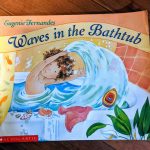Language Development
It has been so lovely to hear from families over the last few weeks. Super nice to receive emails and videos of the children at home too! I have invited you to share any crafty ideas and inspirations for my blog.
One question that has been offered up is about language development in young children. Specifically, what can caregivers do to foster language? Over my years of practice as an Early Childhood Educator I have noticed that some children begin speaking early, while others take extra time, and then there are those that benefit from some help from a speech therapist. I will be addressing ways that adults can support language development regardless of the unique needs of individual children.
It will probably seem obvious to begin with the need to speak to your child. Yet, some parents are not naturally chatty, and it may take some effort to remember to narrate the everyday moments you share with your child. An example of narration might be “Oh, you are eating bananas at the table with your purple spoon”. It could also be, “Mommy just wants to finish this one cup of tea before tidying the living room (for the 6th time today)”. Talking to your child as you go about your day is the most natural way for them to acquire language. Face-to-face interactions have the greatest value because they allow children to soak up language while positively affecting their social and emotional development.
Singing to your child is also a fantastic way to engage them and introduce vocabulary. I can tell you from experience, it can take a lot of repetition before you see the fruits of your effort. Then again, sometimes children surprise me. At a StrongStart a few years back I sang to what seemed like an unresponsive crowd. Later that day a grandma sent me a video of her toddler singing all the words to the song I had sung. He had actually memorized it, not perfectly but enough to tell me that singing to children who are just quietly listening with no signs of interest, is well worth my time (and embarrassment when I sing off key). Our brains are wired for language and even more apt to remember words set to music because sound patterns are stimulating. We sing to express our emotions. Music, emotions and memory have a special relationship. Do you recall songs from your childhood? I would love for you to share them at the comment section below.
The last thing I will cover for now is reading with your child. Reading introduces new words, their sounds, print, and all while giving your child undivided attention. As your child begins to remember the sequence of the story, you may be surprised to find them reading with you! As you read, pause occasionally and wait for them to finish the sentence. They may not pronounce the words correctly, and that is okay! You can repeat the word in an encouraging voice. Let your child choose the book, you can talk about the pictures or make up your own story. Don’t be surprised if your child wants to hear the same story over, and over, and over again. I personally love books that rhyme. Books with animal sounds are also a ‘hoot’. I can be so punny!
Chatting, singing and reading to children can quickly become a natural part of your daily routine. They are calming activities that children will look forward to, and everyone appreciates a bit of calm.
I have a favorite bathtub song that I would be happy to share with you and your little ones, just watch our for the possibility of waves (maybe don’t fill the tub to the top!).


